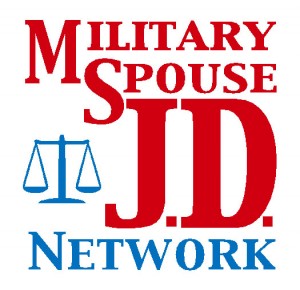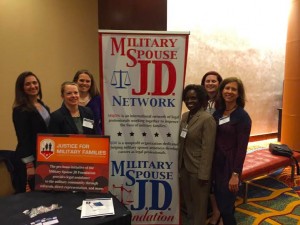Military Spouse Attorney Network Creates Career Opportunities
July 10, 2015
At Hire an Esquire, we’re proud that our attorney network includes many military spouse attorneys who find projects and opportunities to practice through our platform. We chatted with Amy Apostol to highlight the experiences of lawyers balancing their legal practice and the demands of military family life. Amy Apostol is the chairwoman of the Military Spouse JD Network’s Homefront to Hired Committee. She’s also the Deputy General Counsel of the U.S. Department of Defense, the proud spouse of a Navy JAG reservist and the mother of three children. Amy juggles home and professional life in the D.C. area, while her husband supports the Navy in activities around the world.

1. Please tell us a little about the Military Spouse J.D. Network and the Homefront to Hired program.
MSJDN is an international network of military spouse attorneys and supporters that advocates for licensing accommodations for military spouse attorneys, educates the public about the challenges faced by career-minded military spouses and their families, encourages the hiring of military spouses, and offers a social and professional connection for military spouse attorneys.
Through its Homefront to Hired program, MSJDN seeks to expand employment opportunities for military spouse attorneys while simultaneously offering tailored solutions for legal employers to help them identify qualified, well-suited candidates. MSJDN leverages personal relationships with hiring managers and engages with companies who have indicated interest in recruiting military spouses in order to create meaningful and beneficial partnerships with potential employers.
2. How did you get connected with them and what inspired you to take on a leadership role?
I first learned about MSJDN in 2012 while my husband was deployed to Afghanistan, and I was immediately interested in getting involved and taking on leadership with this organization. Like so many others, for me, it was an incredible moment of realizing that there were other people out there who were dedicated to making a legal career work alongside the challenges of the military lifestyle. Upon joining the group’s Facebook page, I was immediately inspired by the stories of strength and determination of the members, and sought out opportunities to help lead an organization whose mission resonated so clearly with me. I’ve had a variety of leadership roles, including serving on the Board of Directors, ever since.

3. What are some little known issues that Military Spouse JDs face? Why do you think they are so little known?
A couple of recently compiled statistics pertaining to our members stand out to me:
-
40% of MSJDN members have a current student loan balance of more than $80,000
-
Only 34% are working full time in a job requiring a law license
-
30% are seeking full time employment
-
29% could not find employment as an attorney following their last relocation
I don’t think that the general public is fully aware of or sympathetic to how much MSJDs actually want to work and experience success in the legal profession. In some instances, the drive to achieve professionally has resulted in military couples living in separate geographic locations for several months or even years.
I also don’t think military spouses get full credit for their ability to perform exceptionally well as employees, even if their time with an employer may be relatively brief. MSJDs are organized, focused, resilient, and flexible individuals who make great attorneys—among our members are federal court judges, Biglaw partners, and bar association leaders. They also happen to believe in service to our country as a part of the military community.
Last, I don’t think the public understands that spouses of reservists also face challenges, though they are more geographically stable. In my own situation, my husband has been away from home more as a reservist than he was while on active duty. Consequently, I’ve learned to successfully juggle home and professional life during his absences.
40% of MSJDN members have a current student loan balance of more than $80,000.
Only 34% are working full time in a job requiring a law license.
30% are seeking full time employment.
29% could not find employment as an attorney following their last relocation.

4. What are some recent achievements that the MSJD Network and the Homefront to Hired program have made that you’re especially proud of?
I remain in awe of the efforts of our organization to advocate for common-sense licensing accommodations, including bar membership without additional examination. 12 states have rule accommodations for military spouse attorneys, and 16 more are pending. When you consider that 2 out of every 5 MSJDN members have taken two or more bar exams and that licensing can take up to a year and cost $4,000 to $5,000 each time, these provisions make a tremendous difference in our members’ ability to attain a continuous, progressive legal career.
With respect to our Homefront to Hired efforts, I have been so impressed by the interest in military spouse hiring we have received from a number of prestigious organizations, including Hire an Esquire. We were recently able to help place a well-qualified member in a permanent attorney position that will allow her to work remotely in a meaningful role no matter where she is stationed with her spouse. She has described her new job as “life changing,” and we are excited to create these kinds of possibilities for other members, too.
With respect to our Homefront to Hired efforts, I have been so impressed by the interest in military spouse hiring we have received from a number of prestigious organizations, including Hire an Esquire.
5. How can technology help military spouse J.D.’s maintain and further their legal careers?
There is no doubt that the use of technology in the legal profession will improve job portability for our members. Technology can enable MSJDs to obtain meaningful long-term employment in a remote capacity. It can also help them perform short-term assignments on a contract basis that allow them to gain transferable skills that will lead to greater responsibility and professional satisfaction over time. Some MSJDs seek flexible, part-time work at various points in their legal career, and email, videoconferencing, and online document sharing all help make that possible. Companies that are willing to engage military spouse attorneys regardless of their geographic location will find that they have hired talented, self-reliant individuals who can perform successfully in a remote work environment.

6. What have you learned from working with Military Spouse J.D.s that you apply to your legal career at the Department of Defense?
Being a military spouse has helped me work more efficiently in my job, honing in on important aspects and communicating effectively to a given audience. At the same time that my husband deployed to Afghanistan, I was selected to supervise a team of attorneys at the Department of Defense. It was incredibly important to me that I perform effectively and seamlessly in my new role despite taking on more responsibility at home. The strength, determination, and resilience of the military spouse experience helped me to succeed during that time, and I see those attributes in the other military spouses I have met over the last several years. They are some of the toughest, most inspiring people I have ever met.
7. In the next 5 years, what do you hope and expect to see change for military spouse lawyers?
Over the next few years, I hope to see continued success in the licensing accommodation efforts. I hope that state bars recognize the value in permitting qualified MSJDs to temporarily practice and that those MSJDs who have utilized the accommodations have demonstrated their value to the legal profession. In addition, I hope that through the development of employer partnerships and community education, the general public will realize the value of hiring military spouses who, like myself, have not had a traditional or standard career progression, but who nonetheless have valuable skills and expertise to bring to any legal job. I also hope that MSJDN continues to reach new members and to bring into the fold those individuals out there who believe they are the only ones attempting to be career-minded military spouse lawyers. Being part of that network is incredibly empowering.
8. What advice would you give a recent law school graduate who is also a military spouse?
I would first advise a recent law graduate who is also a military spouse to develop a solid network of legal professionals who can help make connections with other individuals or to jobs. MSJDN has a mentor program that connects experienced attorneys with newer attorneys based on geography or practice area interests. Through MSJDN, we also encourage our members to be present in their community, participating in local bar association activities and taking advantage of leadership opportunities. I would also advise new graduates to embrace volunteer or short-term opportunities to develop skills and meet people if they are not otherwise employed. Flexibility and perseverance are key attributes for any recent law school graduate.
9. What are some ways that attorneys, law practices, law firms and in-house legal departments can support the work that the MSJD Network and Homefront to Hired is doing?
First, attorneys and legal practices can help MSJDN by demonstrating support for rules change efforts in their state. They can also show support for MSJDs by being willing to hire them despite their potentially short time on site or other geographic limitations. I would encourage potential employers to be flexible and creative when hiring military spouses, seeking out remote work possibilities and other arrangements. In addition, law firms and companies can support MSJDN through financial contributions. MSJDN has a number of sponsorship opportunities that help the organization provide education through Homefront Rising (non-partisan political training seminars to encourage and prepare military spouses to serve in public office) and Making the Right Moves (a professional development event) and legal services through our Justice for Military Families program that connects military families with legal needs to pro bono legal help from MSJDN’s network of military spouse attorneys.
10. If you could change the legal industry in any way (besides what you’re currently doing through the MSJD network) what would you do?
As someone whose remote work experience offered exposure to a number of challenging legal issues in a variety of areas and fostered overall professional growth and development, I am a strong supporter of virtual work developments in the legal profession. Attorneys who work remotely can significantly benefit the employer in a cost-effective manner while simultaneously creating interesting career opportunities. I am also interested in the recent trend toward on-ramping attorneys who have been out of the profession for a period of time and seeking to re-enter it. This experience can certainly apply to military spouse attorneys, but it can be equally applicable to attorneys who have not been able to obtain meaningful professional employment during the economic downturn or for other reasons. Through MSJDN and as an individual, I plan to continue efforts to break down employment barriers and hope that established firms and attorneys will become more open to hiring people who have had a different type of career experience and trajectory and willing to consider flexible, creative employment arrangements.
You can follow MSJDN via their blog or their Twitter, or support the Military Spouse JD Foundation, a 501(c)(3) entity that houses MSJDN’s pro bono and education activity.